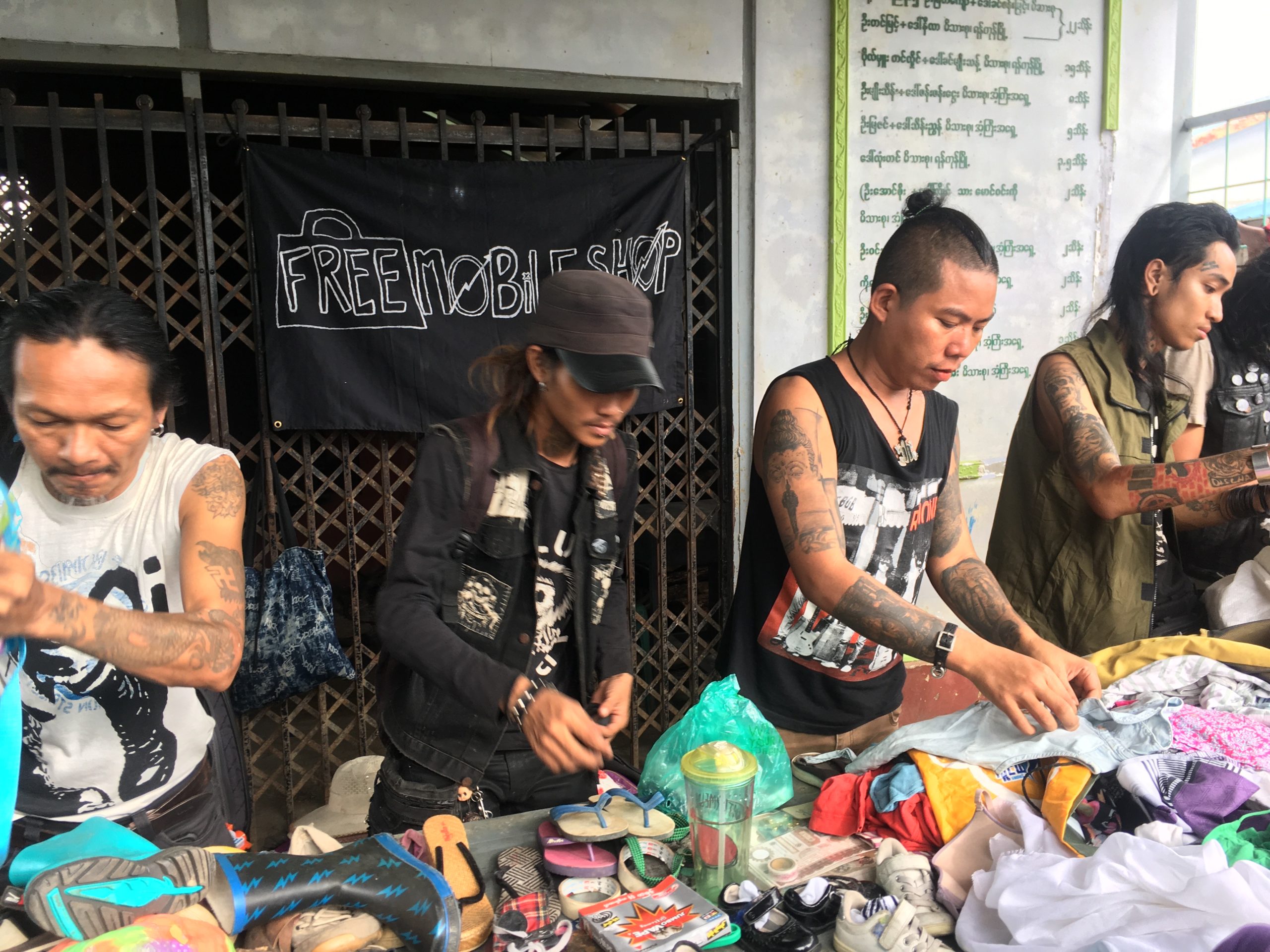To better understand the current democracy struggle in Myanmar, and how Myanmar’s marginalized communities have fought for freedom, I spoke to scholar Carolin Hirsch on Myanmar’s Punk and Punk Rock Community.
Our conversation touches upon the specifics of Myanmar Punks and the broad reasons behind Myanmar’s freedom struggle. I hope you find it useful as a music fan or for building solidarity with Myanmar!
Asia Art Tours: To start could you briefly introduce what first drew you to Myanmar?
Carolin Hirsch: It was simply a coincidence. When I did my master’s degree in Sociology at the University of Konstanz I was working as a student assistant to my now supervisor, Prof. Dr Judith Beyer. She is a legal anthropologist, working in and on Myanmar since 2009. Through this job I came into touch with Myanmar and started to read and inform myself since the work of my boss caught my interest in this country. After I finished my master’s degree, I went on a stereotypically backpacking trip through Southeast Asia. There I took my chance to visit Myanmar for the first time.
Asia Art Tours: Then, what drew you into specifically researching Punk culture in Myanmar?
Carolin Hirsch: This was a coincidence as well. I was writing my Master thesis about Dumpster Diving groups in Germany and was researching the origins of that movement. That’s when I ended up researching Food Not Bombs because one of the founders of the international Food Not Bombs movement seems also to be the first outspoken person that dumpster-dived to rescue food. I went on with a little google search for procrastination to see if there are over lapses with my old interest in food activism and my new regional interest in Myanmar. And there were Food Not Bombs in Yangon, run by the punks of Rebel Community.
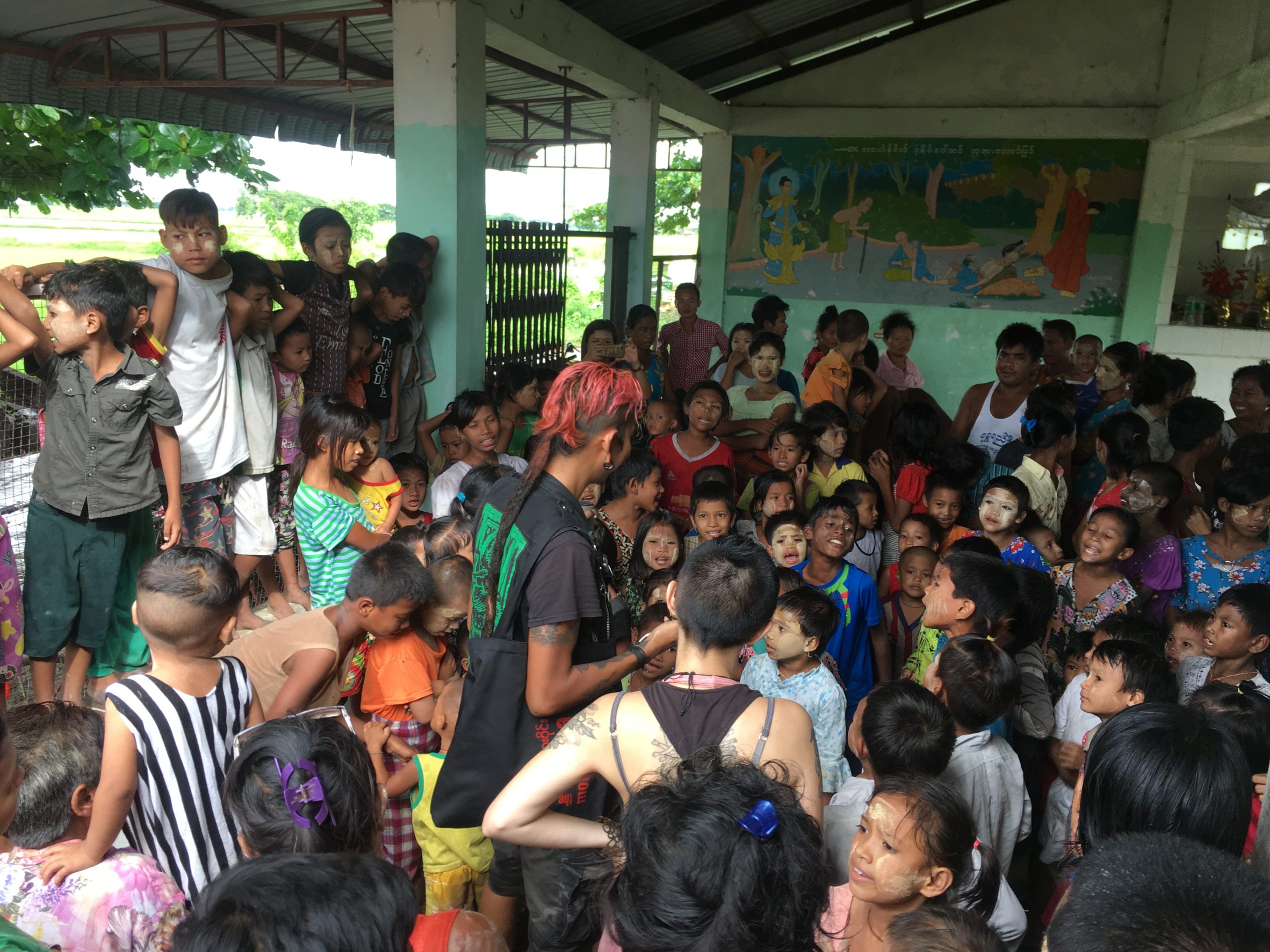 (The Punks of Rebel Community meetings with local children in Myanmar. Photo Credit: CAROLIN HIRSCH)
(The Punks of Rebel Community meetings with local children in Myanmar. Photo Credit: CAROLIN HIRSCH)
Asia Art Tours: What have been some of the stereotypes you’ve encountered within Academia as to the importance of Myanmar’s Punk culture?
Carolin Hirsch: What already happened to me two years in a row at conferences was that I was told that my work is irrelevant. I was presenting different aspects of my research which were all centred around that becoming a punk in my research is equal to becoming an activist. In my PhD project, I consider the punk lifestyle of the Rebel Community members as an activist lifestyle that is dedicated to non-violent, social change on the grassroots level towards a society based on radical social equality. (Ed Note: Rebel Community is a specific punk collective within Yangon’s punk scene.)
It was always the same kind of person that told me this – old white male professors. They took the word punk as a signal word to categorize my work as irrelevant and the individual actors, who I was portraying, as overanalyzed. It seemed to me that they didn’t listen to my analyses and how I put the activism of the punks into the context of the current political and social environment of Myanmar. One of them even told me that he and his mates at university also had crazy hair and some were even getting tattoos and they also thought that they knew how to change the world. He compared himself and his mates, who were university students in the United States in the 1970ies, with young Burmese adults who grew up in poverty under military dictatorship and used to be street kids. When the punks were at the age of him and his mates in university, they also were partly homeless. Some of them didn’t even graduate from high school.
This might now sound like poverty porn, but what I want to say is simple: Check your privilege.
This is a lesson that I learned during my studies, in my interactions with the punks as well as in my academic interactions. Before phrasing your opinion on something, check your privilege. Privilege is not the presence of benefits, it’s just the absence of barriers. And this presence or absence is shaping our view on the world and the reality we are living in and how we can reflect on the given circumstances or presented analyses.
My angle is not to study punk culture in Myanmar, I’m studying how people are becoming activists in the given circumstances. I’m looking at the people’s biographies for example to understand why they are doing the activism they are doing. And the punks of Yangon came a long way. They grew up in poverty, experienced within their families and schools physical and emotional violence and they mostly grew up under military dictatorship – a time to which people in Myanmar refer to as “the dark age” and that they were “living under dark silence”. In my perception becoming a punk gave the individuals a part of their autonomy back and with this the strength to support and care about the people they can identify with – people living in poverty, especially children and the homeless. But all of this seems to be irrelevant when a young woman is talking about punk.
In my perception becoming a punk gave the individuals a part of their autonomy back and with this the strength to support and care about the people they can identify with – people living in poverty, especially children and the homeless
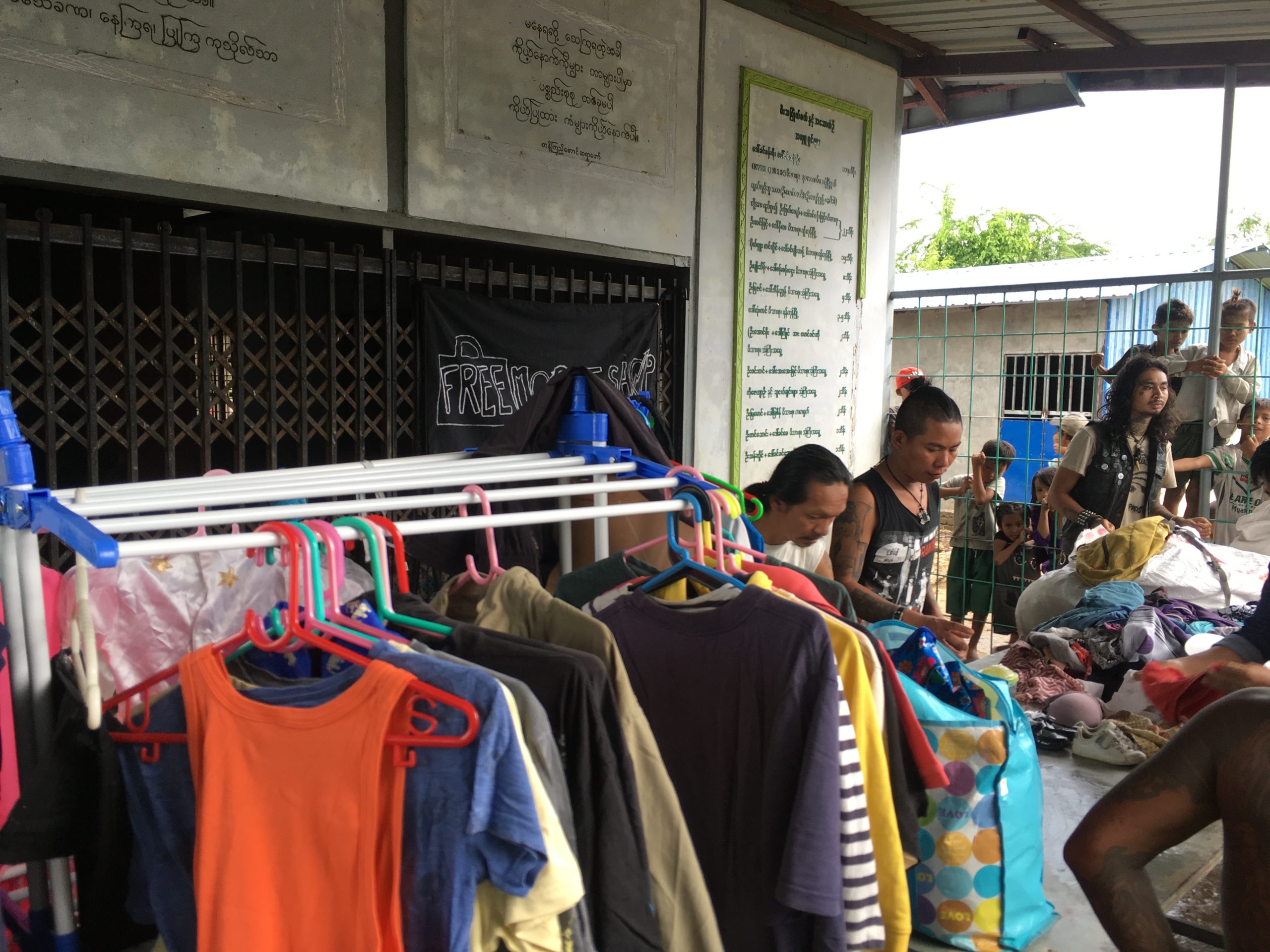 (The Punks of Rebel Community distributing clothes and mutual aid in Myanmar. Photo Credit: CAROLIN HIRSCH)
(The Punks of Rebel Community distributing clothes and mutual aid in Myanmar. Photo Credit: CAROLIN HIRSCH)
Asia Art Tours: Within Myanmar, what are some of the stereotypes, biases, or prejudices against Punk culture?
Caroline Hirsch: The Burmese language doesn’t have a word for the term punk. The punks just use the English term to describe themselves. But if a person doesn’t know that term, the punks are referred to as lan tha yae – lan is the Burmese word for street, tha yae means ghost or spirit. A person that is referred to as lan tha yae is considered a rude person, maybe even a criminal. Using alcohol and/or drugs, not having a job and being in a gang or at least fighting a lot. The visual characteristics are tattoos, not wearing what is considered standard fashion and just looking different from the mainstream. A close friend of mine told me that when she introduced her punk boyfriend to her parents, the mother called him lan tha yae when she first saw him and asked him to please not beat her daughter up when they are fighting. These stereotypes have unfortunately deep and strong roots and are affecting the everyday life of Rebel Community members. When the punks are applying for jobs or apartments and the like, they are being discriminated against for how they look and are rejected. But slowly, also through the national and international media coverage of Food Not Bombs and how they are supporting the marginalized, this stereotype is being deconstructed and the members of Rebel Community are slowly being recognized by their fellow human beings as the punks of Food Not Bombs, spreading love and kindness.
Asia Art Tours: I always considered ‘Punk’ as rebelling against existing aspects of society. Is this the case in Myanmar? If so, what did the punks you interviewed say they were rebelling against? (And why were they rebelling)?
Caroline Hirsch: They are simply rebelling against social inequality and the instrumentalization of religion as a tool to justify these inequalities and discrimination. Myanmar, although it’s a multi-religious and multi-ethnic country, is home to a strong Buddhist nationalism. Most of the population is Buddhist by religion and Bamar by ethnicity. Through this nationalism, the organization of the country is based on structural discrimination against the people that don’t belong to the major religion and/or ethnicity. The probably most horrible and well-known outcome of this is the Rohingya crisis. Racism, sexism, and classism are justified through the instrumentalization of the Buddhist religion. The punks are rebelling against this through taking the Buddhist principle of metta – loving-kindness – and using it as motivation for their actions. They are taking the principles and vocabulary of the Buddhist teachings and are re-interpreting it for themselves as a foundation for their activism.
Myanmar, although it’s a multi-religious and multi-ethnic country, is home to a strong Buddhist nationalism. . . Racism, sexism, and classism are justified through the instrumentalization of the Buddhist religion. The punks are rebelling against this through taking the Buddhist principle of metta – loving-kindness – and using it as motivation for their actions. They are taking the principles and vocabulary of the Buddhist teachings and are re-interpreting it for themselves as a foundation for their activism.
(The punks of Rebel Community entertaining Children in a local village. Video Credit: CAROLIN HIRSCH)
Asia Art Tours: Then when it comes to this rebellion if what the punks are rebelling against (military, traditional gender roles/family structures, capitalism) were to collapse, would their punk identity collapse as well? Or do you see punk identity in Myanmar as its own independent identity that exists beyond the structures it opposes?
Carolin Hirsch: don’t think that their punk identity would collapse. What I see is that if they could reach this utopian world, where the inequalities and discrimination they are working against would have vanished, they would finally have the time to completely heal up themselves from their hardships. In my work, I call them the secret street workers of Yangon. What they are doing is the work of social workers, that take care of marginalized persons that don’t have access to housing, food, health care and education. This is where they come from, and this is where they are now channelling their energy: to support the people they can identify with.
They are giving what they were lacking when they were still living on the streets, especially to the children. What the punks of Rebel Community are doing is punk parenting – they are playing with the street kids and are listening to their problems. They are bringing food, clothes, and toys for these children that either live on their own on the street or are living in the outskirts of Yangon or the villages around in bitter poverty. If these marginalized children would get access to proper housing, food, health care and education, I think the punks would go on hanging out with them but focus their support on the creativity of the children through music, art and philosophy and raise the next generation of peaceful rebels to secure this utopian world.
Asia Art Tours: Historically, what examples exist as the foremothers of Punk in Myanmar? What – music, art, history, or culture – do they cite as influences that make up Myanmar Punk identity?
Carolin Hirsch: It’s a colourful mix and match of different influences – or “inspirations” how Kyaw Kyaw, the lead guitarist and singer of Rebel Riot, likes to call it. He once told me: “We cook our punk curry”. And I think this curry metaphor hits the nail on the head. The first inspirations came in 1994 in the form of a videotape of the band Sex Pistols to Yangon. I would say that’s the oil that got poured into the pan and heated up to fry the ingredients over the years. Buddhist principles – the regional vegetables so to say – were added after a while. This all got spiced up with regional influences. One of these regional influences is punk from Indonesia. The band Marjinal from Jakarta for example is one of those spicy influences. The punks of Rebel Community have friendships and ties all over the world. They are having people from everywhere coming to Yangon visiting and exchanging with them.
I call them the secret street workers of Yangon. What they (the punks) are doing is the work of social workers, that take care of marginalized persons that don’t have access to housing, food, health care and education. This is where they come from, and this is where they are now channelling their energy: to support the people they can identify with.
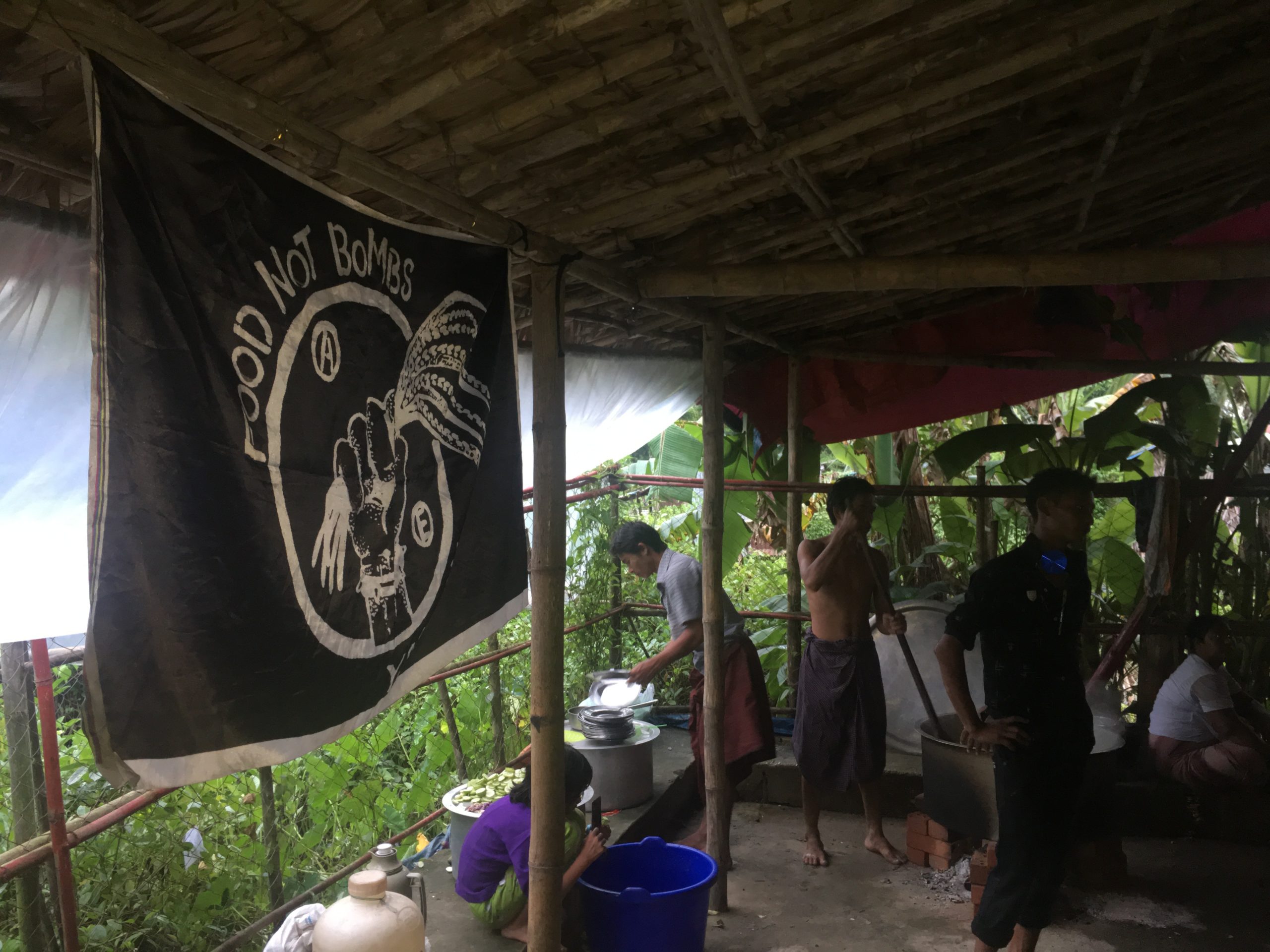 (A Food Not Bombs kitchen organized by the Rebel Community Punks in Myanmar. Photo Credit: CAROLIN HIRSCH)
(A Food Not Bombs kitchen organized by the Rebel Community Punks in Myanmar. Photo Credit: CAROLIN HIRSCH)
But they are also travelling. The band Rebel Riot, around which Rebel Community is centred, already went on tour in Thailand and Indonesia. And in 2017 they went on a UK tour and in 2018 they went on a tour through Czech Republic, Germany, and Switzerland. These tours were financed through crowdfunding and Rebel Riot was hosted by local friends, punks, and supporters in their homes and squads. On these tours Rebel Riot didn’t only play gigs; they were also raising awareness for the situation in Myanmar and the work they are doing through Food Not Bombs. These tours were also inspirational for them since they did not only talk about their work and educate the people on the situation in Myanmar, but they also collected impressions and brought back new ideas and inspirations for their punk and work within their community. In the sense of the curry metaphor, some more herbs and sides for the already cooked up punk curry.
Asia Art Tours: What influences do the punks of Rebel Community take from punk movements either in the region and globally? And have they started to build solidarity with other regional/global punk movements?
Carolin Hirsch: The punks of Rebel Community are having a huge network of friends and supporters all around the world. It’s giving and taking of support and solidarity. And it’s a constant exchange between different influences and inspirations. Just how it works in interpersonal relationships – it’s not always inseparable and visible from where or how a certain characteristic is influenced. The punks of Rebel Community are reflecting on the life they want to live and the work they want to do. And during this, they reflect on the knowledge and information they gained from their interactions and if it serves their purpose or not. Like I already mentioned above: It’s their punk curry, served hot and spicy with love and kindness.
Since the military coup in February, they are getting a lot of support and solidarity messages, pictures, and actions from regional and global punks, individuals, and collectives. I cannot offer you a complete overview of the solidarity and support they are currently receiving, but I would like to highlight two solidarity samplers that got organized. The collected money is directly transferred to support the work of Food Not Bombs right now during the anti-coup protests.
These two samplers can be downloaded via Bandcamp. One is organized by With Oi! to Hope and is just called Against the Military Coup. The other one is organized by the Swiss punks from Kochareal in Zürich and is called United Punk Solidarity Myanmar.
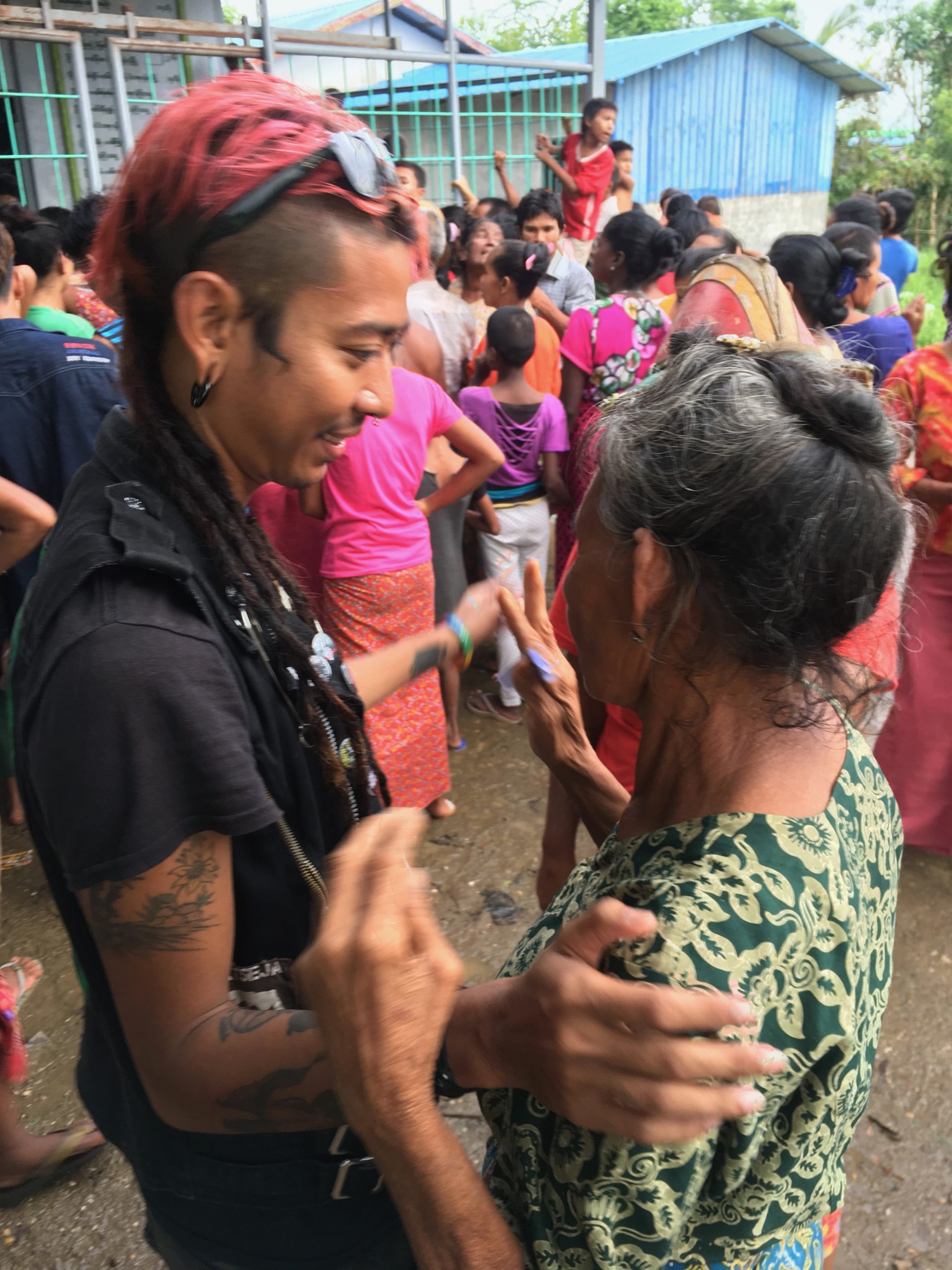 (A Rebel Community Punk meeting with an elderly villager. Photo Credit: CAROLIN HIRSCH)
(A Rebel Community Punk meeting with an elderly villager. Photo Credit: CAROLIN HIRSCH)
Asia Art Tours: For the punks of Myanmar, how do they see their politics represented in the larger social movement that’s currently protesting the Tatmadaw coup of Myanmar?
Carolin Hirsch: One important thing is that the punks don’t talk about politics when they talk about their work and goals. To explain why the word politics is rarely used by the punks would go beyond the scope of this text. But what I can say is that they are represented in the context of the larger social movement because they don’t accept the SAC – the State Administration Council that was formed by the military during the coup – as the legitimate government of Myanmar.
In 2007 during the Saffron Revolution, the punks were already protesting side by side with monks for democracy and against the military regime. Back then the band Rebel Riot got formed because they wanted to contribute and not stop to speak their minds after the protests got bloodily beaten down. When the protests started at the beginning of February Rebel Riot started releasing songs to support the protests. The first song they released is called One Day and is about an imagined future for which they need to fight now to get rid of the oppressive system to create a free world for the next generation. And I think this is what the protest movement is uniting: The generations that were mainly growing up and living under the military would like to spare their children this fate. And the youth, that mainly grew up and lived in the last ten years under a democratic government wants to go on with the democratization of the country and not give up the freedom they already tasted.
Asia Art Tours: And what lessons/tactics does Myanmar Punk, have for this historical moment of protest?
Carolin Hirsch: The tactics are the same as usual I’d say, but now they are more visible. Like I already mentioned, Rebel Riot is releasing songs to support the protests. The songs were already written before, but in the context of the protests, they become more powerful and reach more people.
They are still doing Food Not Bombs and are travelling to villages around Yangon or to the outskirts, where the poor people live and bring food and clothes. There they are playing with the children, making music, and making them laugh. When the pandemic hit the country Food Not Bombs started to support garment workers, sex workers and especially older persons that are either living in poor conditions or are homeless. They are still going on with this support, which includes food, clothes, masks, money, and diverse safety equipment.
They are still doing what they did before the pandemic hit the country and before the military had seized power, only more often and regularly. But now it became more visible how badly the work of Food Not Bombs is needed, as the already precarious livelihood of the people is even more endangered.
When the protests started at the beginning of February Rebel Riot started releasing songs to support the protests. The first song they released is called One Day and is about an imagined future for which they need to fight now to get rid of the oppressive system to create a free world for the next generation. And I think this is what the protest movement is uniting: The generations that were mainly growing up and living under the military would like to spare their children this fate.
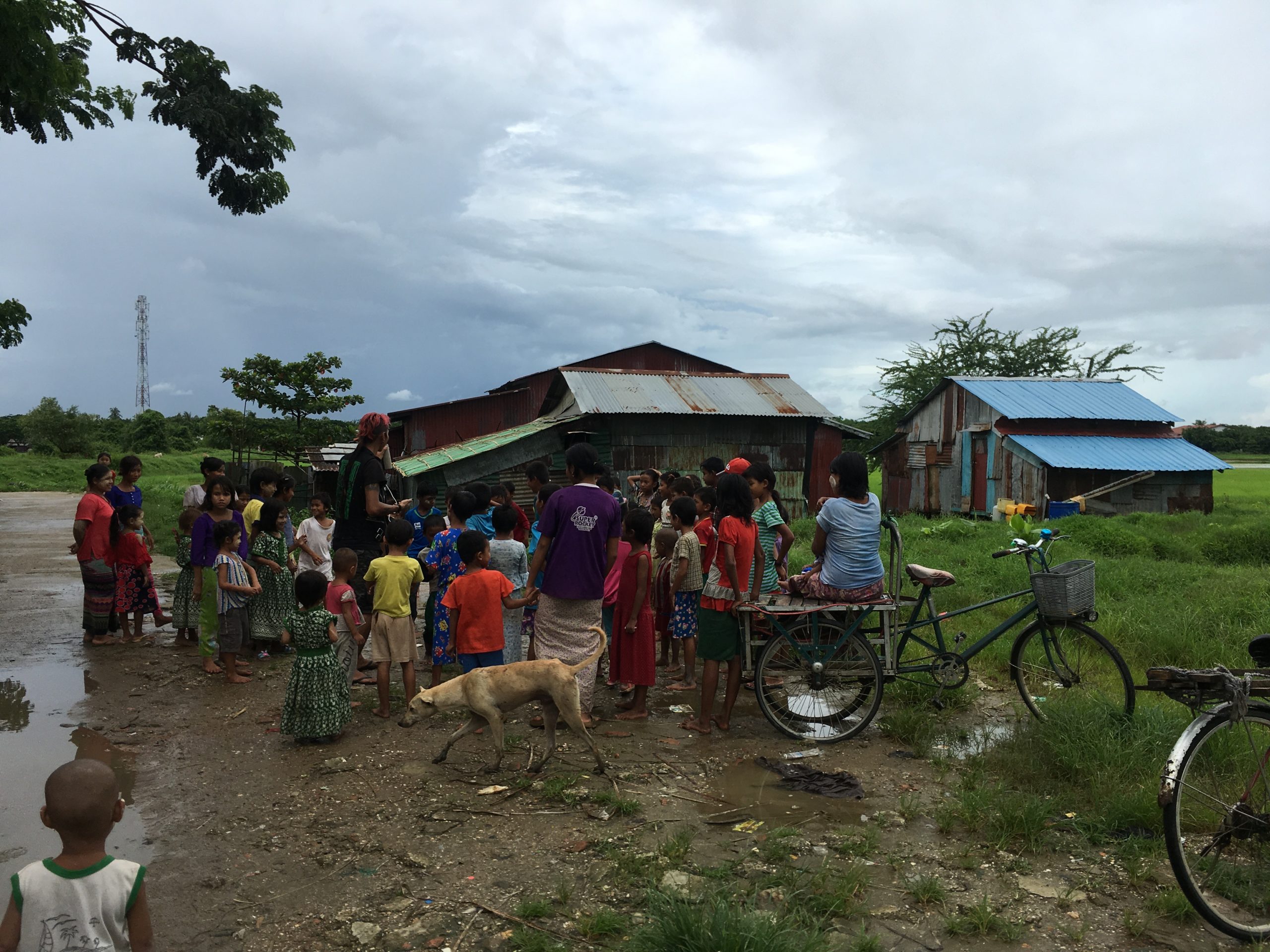 (A Rebel Community Punk entertaining Children. Photo Credit: CAROLIN HIRSCH)
(A Rebel Community Punk entertaining Children. Photo Credit: CAROLIN HIRSCH)
Asia Art Tours: Lastly, how can punks globally support the Myanmar protesters?
Carolin Hirsch: Inform yourself of the history and the current situation in Myanmar. Talk about it, share it widely and use all your channels for this. No matter if it’s just in private conversations, on your social media accounts or through organizations where you are active. You can also organize rallies and vigils in your town. It’s important to maintain public awareness. Write to your local politicians and encourage your government to not recognize the Tatmadaw as the legitimate government of Myanmar and to cut ties with military-run businesses. You could also start petitions for the recognition of the NUG – the National Unity Government – that was formed to represent the legitimately elected government until it can take office.
Globally operating companies are also important when it comes to which side is supported: The military or the people of Myanmar. In Myanmar are a lot of garment factories, our clothes are also sewed there. Research which brands are producing there and encourage these brands to either cut ties with businesses that support the military regime or to go on paying their workers and allow them to go on strike without being afraid of losing their job and income. You can email these companies, tag them on Twitter or just protest directly in front of their office buildings.
Asia Art Tours: And if the protests are successful, what kind of ‘Myanmar’ do local Rebel Community punks want to build? What would a ‘Myanmar’ look like if Rebel Community punks (and all of Myanmar’s Punks) felt like they belonged?
Carolin Hirsch: An inclusive one. I wouldn’t say that they now feel or felt in the past that they didn’t belong to this version of Myanmar they are criticizing. Most of the members of Rebel Community are male, Buddhist and Bamar. In this sense, they belong to the majority, but they made themselves a minority by becoming punks since they don’t agree with how the access to basic needs is organized. Their approach to discrimination was and still is classism. This was the first discrimination they were rebelling against. After they started this rebellion, they included other ways of discrimination like racism and sexism to rebel against. The Myanmar they would like to build is an inclusive one. A Myanmar in which no one must face or fear physical and emotional violence through repression, discrimination, and civil wars. A Myanmar in which everyone can live a safe life with access to proper housing, enough food, free health care and education.
The Myanmar they would like to build is an inclusive one. A Myanmar in which no one must face or fear physical and emotional violence through repression, discrimination, and civil wars. A Myanmar in which everyone can live a safe life with access to proper housing, enough food, free health care and education.
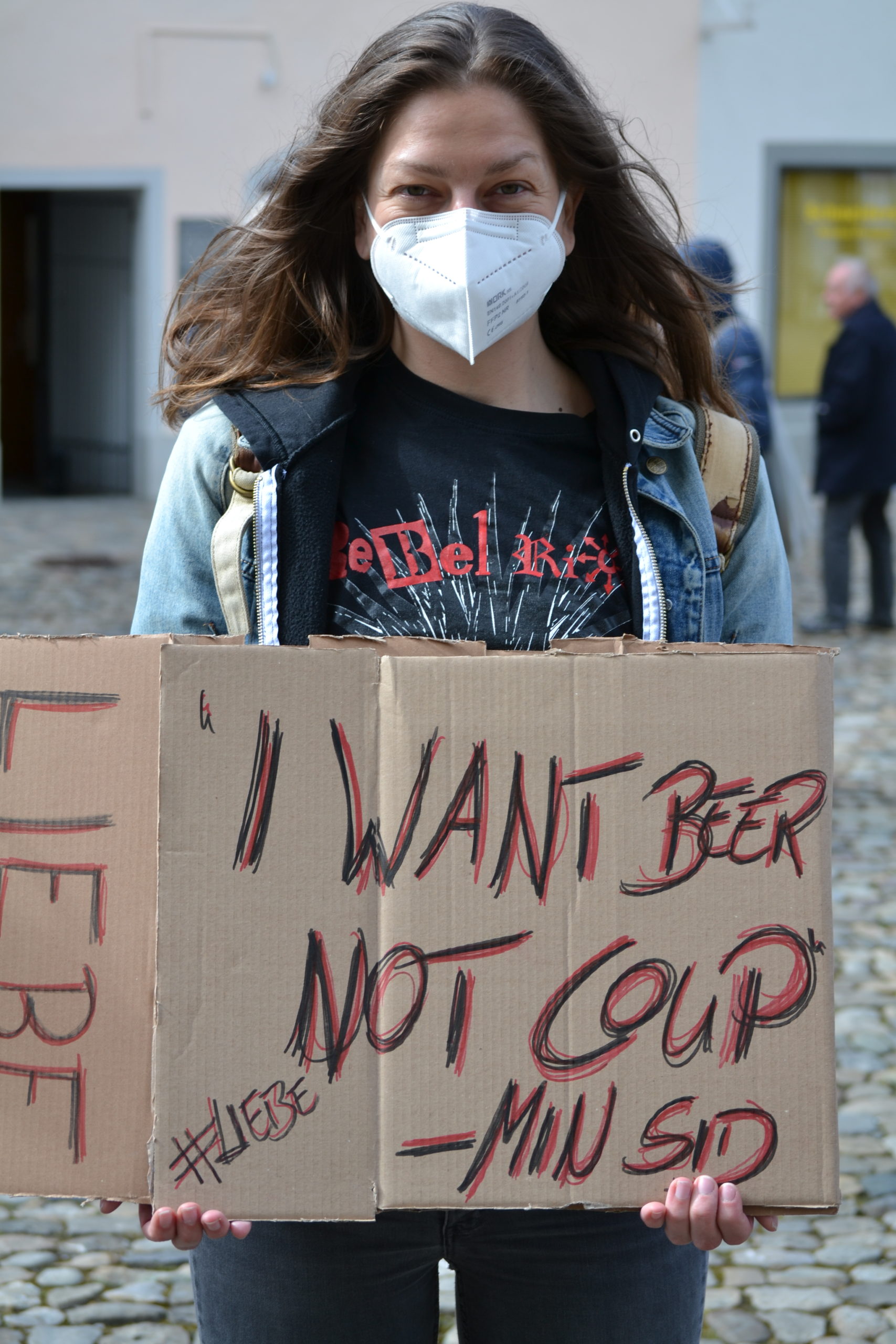 ( Carolin Hirsch holding a sign in support of Myanmar’s freedom struggle. Photo credit: CAROLIN HIRSCH)
( Carolin Hirsch holding a sign in support of Myanmar’s freedom struggle. Photo credit: CAROLIN HIRSCH)
ABOUT THE INTERVIEW GUEST: Carolin Hirsch is enrolled as a PhD candidate in Social and Political Anthropology at the University of Konstanz in Germany. She carried out long-term ethnographic fieldwork in urban Yangon in Myanmar, focusing on a group of punk activists who are centered around the Burmese punk band Rebel Riot. This group of punk activists named themselves Rebel Community and is, among other initiatives and using music and art as tools for their activism, spearheading the Yangon chapter of Food Not Bombs. Carolins’ PhD project currently carries the working title “Rebel becoming. (In)visible people in (non)existing places”. Right now, she is at her home institution, writing her doctoral thesis.
The pictures featured in this article were taken by Carolin Hirsch in July 2019. Food Not Bombs used to go regularly across the river in Yangon to small fisher villages to spend whole days there. On this trip the punks brought food, clothes, and time. Some of the villagers were cooking dinner from the rice and vegetables brought, while the punks were playing with the children and making music with them. As well they were organizing the distribution of the clothes. In the late afternoon the villagers and punks started to have dinner together in a hut that was used as a common place. These actions used to start around sunrise with buying and collecting the items brought, travelling to the village, spending time there and going back to Yangon with motorbikes and the ferry around sunset.
Since the pandemic arrived in the country, the punks have been arranging such actions more often and have started visiting even more communities in and around Yangon. The punks have also started to support sex workers and factory workers. After the coup in early February, the situation in the country has become even worse and the punks’ work is even more necessary than before.

